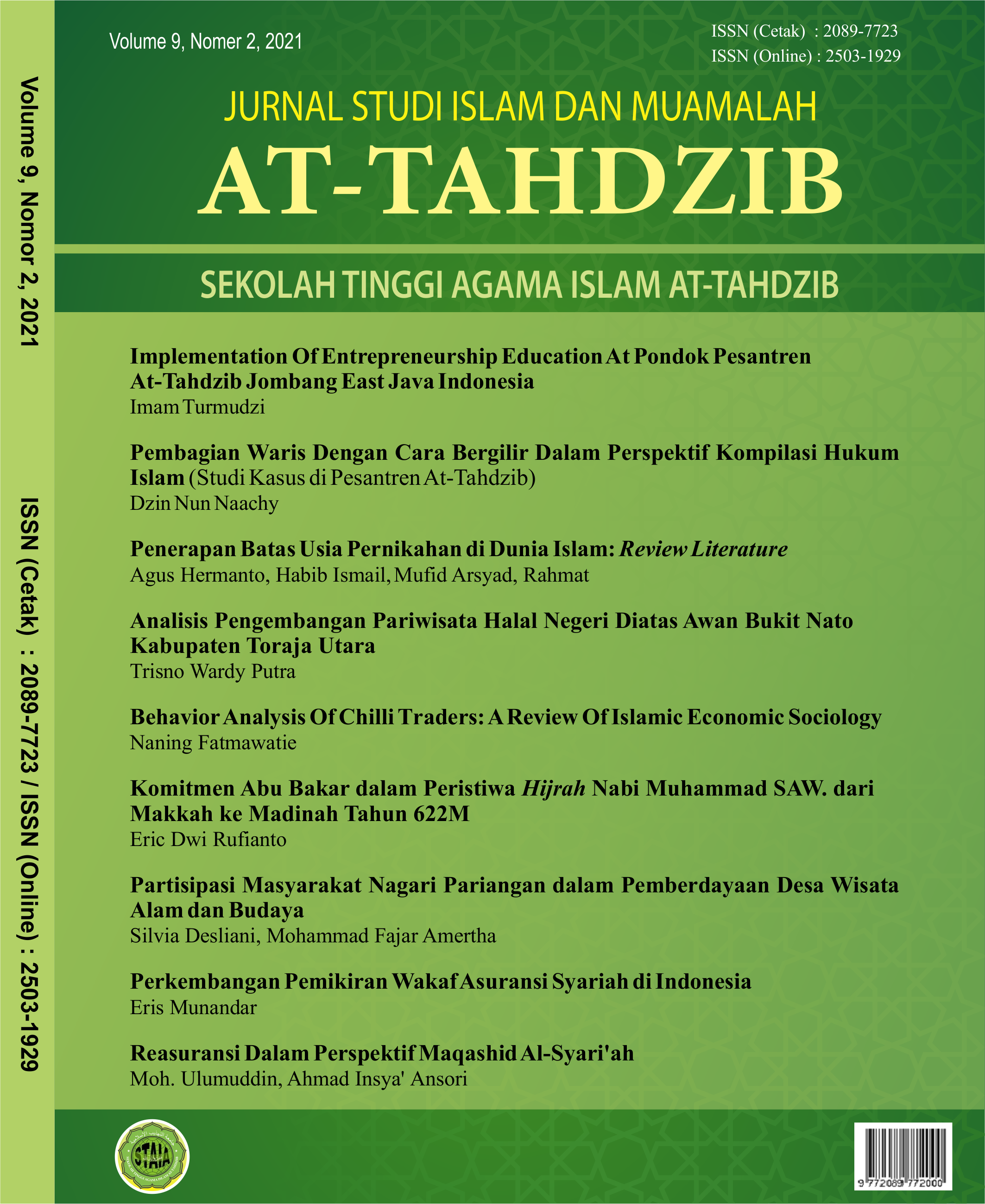Analisis Pengembangan Pariwisata Halal Negeri Di Atas Awan Bukit Nato Kabupaten Toraja Utara
Abstract
Background. The majority of the Toraja people embrace Christianity, some are Muslim and believe in animism or commonly called Alu To Dolok. Halal tourism, both in terms of guaranteeing halal products and in terms of places of worship, is needed to increase Muslim tourists in North Toraja Regency.
Aim. This study aims to describe the analysis related to the development of halal tourism in the country above the clouds of Nato Hills, North Toraja Regency, in providing religious services and facilities for Muslim tourists.
Methods. The method used in this study is a qualitative method, the characteristic of this research lies in the purpose of describing a case by understanding the meaning and symptoms, so that the data analysis used is descriptive analytical.
Results. The results showed that the development of halal tourism in North Toraja Regency had experienced rejection due to public misunderstandings regarding the word halal, so the term halal tourism was replaced with Muslim-friendly tourism. The development of domestic halal tourism above the cloud has become a concern for the government, but the budget is limited so that the development of halal tourism is not running effectively and efficiently.
References
Carboni, M., Perelli, C., & Sistu, G. (2017). Developing tourism products in line with Islamic beliefs: some insights from Nabeul–Hammamet. Journal of North African Studies, 22(1), 87–108. https://doi.org/10.1080/13629387.2016.1239078
Chanin, O., Sriprasert, P., Rahman, H. A., & Don, M. S. (2015). Guidelines on Halal Tourism Management in the Andaman Sea Coast of Thailand. Journal of Economics, Business and Management, 3(8), 791–794. https://doi.org/10.7763/joebm.2015.v3.287
Dauda, K. O. (2021). Islamophobia and religious intolerance: Threats to global peace and harmonious co-existence. Qudus International Journal of Islamic Studies, 8(2), 257–292. https://doi.org/10.21043/qijis.v8i2.6811
El-Gohary, H. (2016). Halal tourism, is it really Halal? Tourism Management Perspectives, 19, 124–130. https://doi.org/10.1016/j.tmp.2015.12.013
Makhasi, G. Y. M., & Rahimmadhi, M. T. Y. (2020). ramai-ramai menolak wisata halal: Kontestasi politik identitas dalam perkembangan wisata halal di Indonesia. Jurnal Sosiologi Reflektif, 14(2), 373. https://doi.org/10.14421/jsr.v14i2.1767
Mastercard & Crescent Rating. (2019). Global Muslim Travel Index 2019. April, 01–63.
Mastercard & Crescent Rating. (2019). Ibid..
Md Siddique E Azam, Mohd Asri Abdullah, & Dzuljastri Abdul Razak. (2019). Halal tourism: definition, justification, and scopes towards sustainable development. International Journal of Business, Economics and Law, 18(3), 23–31. https://www.ijbel.com/wp-content/uploads/2019/05/KLIBEL-18_64.pdf
MUI, L. (2019). Menuju Indonesia sebagai Destinasi Wisata Halal Dunia. Www.Halalmui.Org. https://www.halalmui.org/mui14/main/detail/menuju-indonesia-sebagai-destinasi-wisata-halal-dunia
National Sharia Council - Indonesian Ulema Council. (2016). Pedoman Penyelenggara Pariwisata Berdasarkan Prinsip Syariah. Journal of Chemical Information and Modeling, 53(9), 6–9.
Tenola, D. (2019). Pemprov Sulsel fokus garap wisata halal di Toraja. Jawapos.Com. https://www.jawapos.com/jpg-today/25/02/2019/pemprov-sulsel-fokus-garap-wisata-halal-di-toraja/
Tim Lajnah Pentashihan Mushaf Al-Qur'an, 2013
Vargas-Sánchez, A., & Moral-Moral, M. (2020). Halal tourism: literature review and experts’ view. Journal of Islamic Marketing, 11(3), 549–569. https://doi.org/10.1108/JIMA-04-2017-0039
Copyright (c) 2021 At-Tahdzib: Jurnal Studi Islam dan Muamalah

This work is licensed under a Creative Commons Attribution 4.0 International License.

Jurnal Studi Islam by At-Tahdzib is licensed under a Creative Commons Attribution 4.0 International License.
Based on a work at http://ejournal.kopertais4.or.id/mataraman/index.php/tahdzib

